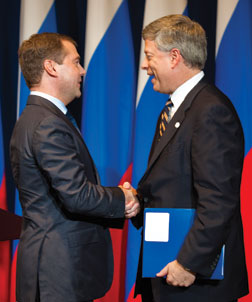Russian President Medvedev Visits Pitt, Discusses Changes in U.S.-Russian Relations—And Talks a Little Bit About Himself, Too
 Russian President Dmitry Anatolyevich Medvedev (left) and Chancellor Mark A. Nordenberg
Russian President Dmitry Anatolyevich Medvedev (left) and Chancellor Mark A. NordenbergRussian President Dmitry Medvedev’s visit last week to the University of Pittsburgh was in keeping with Pittsburgh and Pitt’s long history with Russia. Medvedev took a break from his G-20 Pittsburgh Summit duties on Sept. 25 to visit the Cathedral of Learning’s Commons Room for a late afternoon question-and-answer session with an audience composed predominantly of Pitt students that also included Pitt faculty, staff, trustees, and alumni, as well as a flock of Russian and American reporters.
Medvedev also visited the Cathedral’s Russian Nationality Room, dedicated in 1938, which pays tribute to the presence of Russian émigrés who came to Pittsburgh, bringing their culture and traditions with them. Pitt Chancellor Mark A. Nordenberg, during his introduction of the Russian president, said that today Pitt promotes and preserves Russian culture through the University’s Center for Russian and Eastern European Studies, the Department of Slavic Languages and Literatures, and student exchange programs. “We hope to elevate that sense of connection to newer heights as we listen to and learn from President Medvedev,” Nordenberg said.
Medvedev addressed the estimated 300-plus people gathered in the Cathedral of Learning Commons Room. But before he began the question-and-answer session, he made reference to former Soviet Premier Nikita Khrushchev’s 1959 tour of the United States and his visit to Pitt’s Schenley Hall ballroom (now the William Pitt Union).
“It is a great pleasure to have this opportunity to share with you my vision of events past and present in Russia, Russian-American relations, the global challenges, and problems that we all face … It is particularly interesting to know that exactly 50 years ago, one of the Soviet leaders visited this very place. I cannot say that we are close politically, or that I share his views, but it is interesting whatever the case to note this coincidence. Nothing is ever completely coincidence, after all,” Medvedev said.
“I hope, too, that you will not ask me the same questions as were put to Nikita Khrushchev 50 years ago, because life has gone on, and we have all changed since then. Actually, I can’t say that I have changed since then because I was not even born 50 years ago, but there is no question that our countries have undergone great change since then. We are no longer divided by the barriers of ideology and values that existed then. We share practically the same views on global development issues and respond in the same way to problems at home.
“There are no doubt issues that arouse in us different emotions, things on which we do not see eye-to-eye, but this is good, too, for this is one of the driving forces that has been helping humanity to develop over thousands of years. We are all different, and this is good. At the same time, we share common values, and this is also good.”
Medvedev then took unscripted questions from the students in the audience—ranging from those who sought his advice to college students, to those who pressed him on Russia’s relations with some of its neighbors. (Nordenberg noted that the president, a one-time instructor at St. Petersburg State University, had declined a moderator, preferring personal exchanges.)
As the son of a professor and a former teacher, Medvedev, when asked what advice the president of a major country can offer Pitt students, told them to relish their years in academia.
“I have had all sorts of experiences in my life: I was a graduate student, a teacher, a lawyer, I worked in business, became a civil servant, worked in the government,” he said. “Now I am president of a large country, but I can tell you that those years when I was a law student were the happiest years of my life. It [your time in college] is also an important foundation for your future lives and should motivate you to seek learning every single day. So, my advice to you is to treasure this time. I envy you.”
A transcript of the question-and-answer session with President Medvedev is available on the Kremlin Web site.
Other Stories From This Issue
On the Freedom Road

Follow a group of Pitt students on the Returning to the Roots of Civil Rights bus tour, a nine-day, 2,300-mile journey crisscrossing five states.
Day 1: The Awakening
Day 2: Deep Impressions
Day 3: Music, Montgomery, and More
Day 4: Looking Back, Looking Forward
Day 5: Learning to Remember
Day 6: The Mountaintop
Day 7: Slavery and Beyond
Day 8: Lessons to Bring Home
Day 9: Final Lessons

